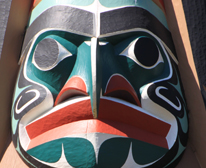AUTHENTICITY
ENDURING TIES TO THE LAND AND THE SEA. With a tribal heritage that spans thousands of years, and survival that has relied upon successful harvests of shellfish and finfish along the Olympic Peninsula, it's safe to say the Jamestown S'Klallam Tribe knows a thing or two about seafood.

Archaeological evidence - the remains of a butchered Mastodon accompanied by a roughly hewn spear point - reveals human habitation in the Pacific Northwest started sometime around 14,000BC. In their tribal history, S'Klallam life dates back nearly 10,000 years. In Port Angeles, the recent discovery of the Tse-white-zen settlement indicates a localized tribal community at least 2,700 years old.
No matter how far back we look, there is consistent evidence confirming tribal activity in the area, and both shellfish and finfish functioning as important dietary staples and a cultural mainstay.
Today, the people of the Jamestown S'Klallam Tribe continue to value seafood and thrive on an abundance of oysters, geoduck clams, and other seafood species.
From a commercial perspective, and while they no longer utilize the digging sticks, shell scoops, spears, dip nets and work baskets that their ancestors required, Jamestown Seafood utilizes state-of-the-art tools and technologies to ensure consistent, sustainable and delicious harvests. They have established productive fisheries for both Pacific Oysters and Geoduck Clams along the Strait of Juan de Fuca in Sequim Bay (pronounced "SKWIM" Bay), and developed a world-class hatchery in Quilcene Bay.
Jamestown Seafood wants to be sure that, for another ten thousand years, future generations will be able to enjoy the oysters, clams and other seafoods of the Pacific Northwest. Accordingly, the company has partnered with both State and Federal conservation and watershed management agencies to restore native species and create sustainable seafood populations throughout the Olympic peninsula.
